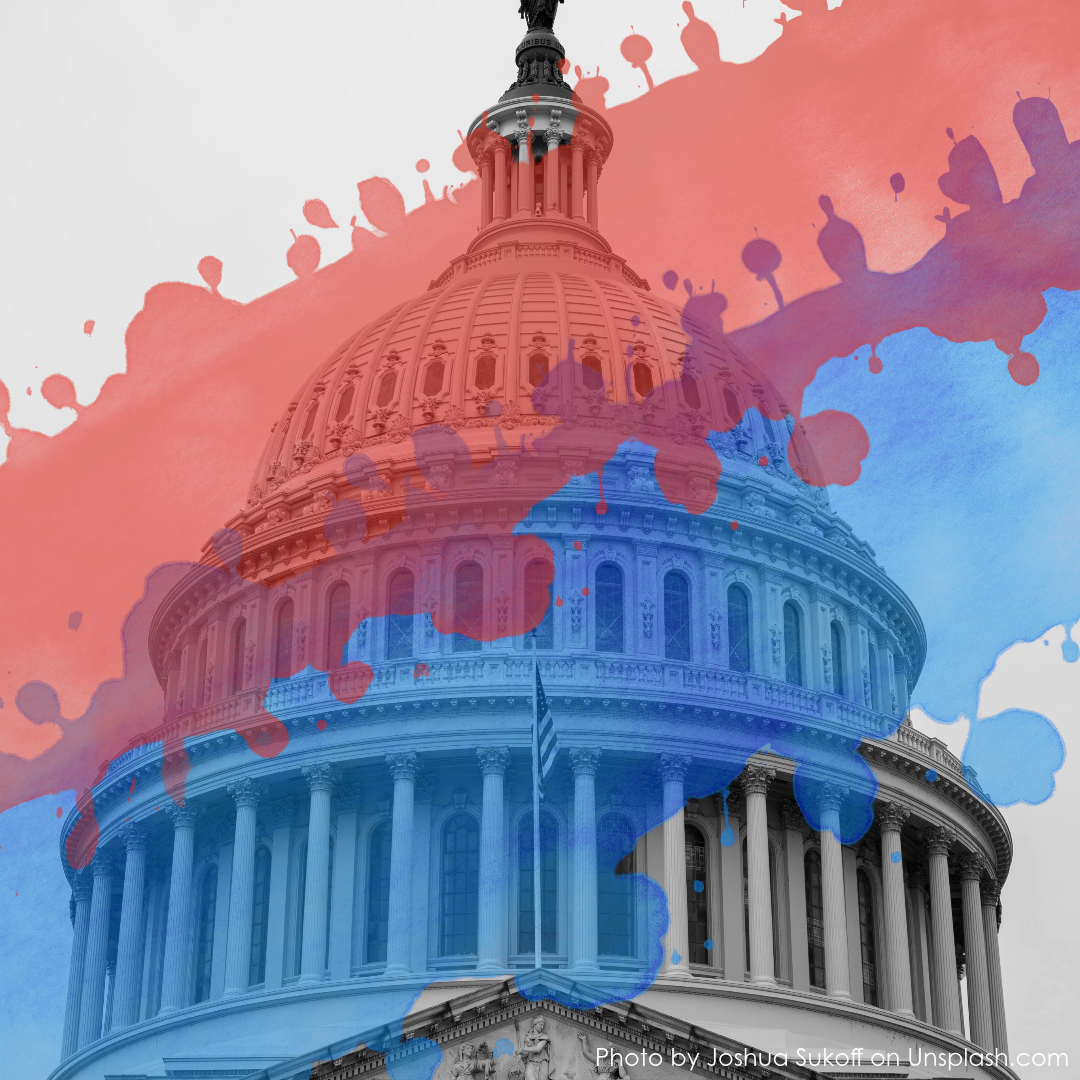

Last week (October 25th, 2023) House Republicans unanimously elected Mike Johnson speaker of the House ending a 22-day vacancy during which the House of Representatives was unable to conduct legislative business.
Prior to being elected speaker, Mike Johnson was not a nationally known politician. In fact, even several prominent Republican senators including Senate Minority Whip John Thune (SD), Shelley Moore Capito (WV), and Susan Collins (ME) expressed they did not know Johnson particularly well. Johnson was first elected to the House of Representatives in 2016 and represents Louisiana’s 4th congressional district. During the 118th Congress, he served on the Armed Services Committee and the Judiciary Committee, where he was the Chair of the Subcommittee on the Constitution and Limited Government. Johnson also served as Vice Chair of the Republican conference in the House of Representatives. By now, most media outlets have written detailed backgrounds on Johnson, his beliefs, and his political career up to this point. (For example, see: Who is Mike Johnson? Five things to know about the new Republican House speaker and Who is Mike Johnson? An ardent conservative who embraces far-right policies.) Some highlights include his consistent record as a social conservative, Johnson is a vocal opponent of abortion access and same-sex marriage, and his role in trying to overturn the 2020 presidential election. The purpose of this post is not to provide another introduction to Speaker Johnson. Instead, my purpose is to highlight the historic events within Congress that got us to this point and to share what political science research has to say about the speaker of the House vacancy and the election of Johnson as speaker.
One prominent theory of congressional behavior that I believe helps us to understand the struggles faced by House Republican leaders during the 118th Congress is the theory of Conditional Party Government offered by John Aldrich and David Rohde. Conditional Party Government theory assumes members of Congress are motivated by both electoral goals and policy goals and that members of Congress will delegate varying degrees of power and leeway to their leaders to work towards these goals. When the Democratic and Republican Party are both internally unified, and polarized with one another, members of Congress tend to empower their leaders a great deal. However, when a party in Congress is internally divided, members of Congress are less willing to empower their leaders, even during periods of high political polarization.
This is the situation in which House Republicans currently find themselves. Over the past few years, the divide within the Republican Party has been described as conservatives v. moderates, establishment Republicans v. insurgent Republican, and Trump supporters v. never-Trump Republicans, but regardless of how the divide is characterized, it is present. Moreover, given the Republican Party’s narrow majority in the House of Representatives during the 118th Congress, currently 221 Republicans, 212 Democrats, and 2 vacancies, the divide within the party does not even need to be particularly large to potentially limit its ability to govern.
Even infrequent observers of Congress likely remember Former Speaker of the House Kevin McCarthy’s challenge to earn the votes necessary to become speaker back in January. It took McCarthy 15 ballots on the House floor to become speaker, even though he was overwhelmingly the Republican Party’s top choice to become speaker. While the speaker of the House is technically elected by the entirety of the House of Representatives, it is effectively the majority party who elects a speaker since they hold the majority and enough votes to select their preferred candidate if they are unified. Historically what happens is that the majority party will hold an election during a conference meeting and whichever candidate wins majority support from the party, which sometimes requires more than one ballot, becomes the party’s nominee on the House floor. While majority party defections on the House floor are not unheard of, for example, several Democrats voted present or for someone other than Nancy Pelosi at the start of the 117th Congress, normally enough members of the majority party who supported another candidate during the conference meeting fall in line when voting on the House floor. In January McCarthy consistently had the support of at least 200 Republicans across all 15 ballots. It was only a small fraction of the Republican Party who because of the Republican Party’s small majority were able to prevent McCarthy from becoming Speaker on the 1st through 14th ballots. To win the support, or at least deference, from enough of these holdouts, McCarthy had to make deals with individual members. When viewed through the theory of Conditional Party Government, this suggests the Republican Party was less willing to delegate power and autonomy to McCarthy than previous Speakers, putting him in a difficult position at the start of the 118th Congress.
Ultimately, it was one of McCarthy’s concessions to the Republican holdouts that ultimately laid the groundwork for his historic removal from the speakership. He agreed to change the required threshold to introduce a motion to vacate the speakership to a single legislator. This allowed Florida, Republican Representative Matt Gaetz to introduce a motion to vacate on Tuesday, October 2nd, days after McCarthy negotiated a bipartisan continuing resolution to avoid a government shutdown. Gaetz and seven other Republicans then voted with the unified House Democrats to remove McCarthy as speaker, making McCarthy the first speaker in US history to be removed via a vote on the House floor.
During the next three weeks, House Republicans struggled to coalesce round a replacement for McCarthy. At various points across several Republican conference meetings, at least 14 Republicans had candidacies to become the next speaker of the House: Majority Leader Steve Scalise (LA), Jim Jordan (OH), Majority Whip Tom Emmer (MN), Mike Johnson (LA), Byron Donalds (FL), Kevin Hern (OK), Jack Bergman (MI), Austin Scott (GA), Pete Sessions (TX), Gary Palmer (AL), Dan Meuser (PA), Chuck Fleischmann (TN), Roger Williams (TX), and Mark Green (TN).
As the highest-ranking House Republican after McCarthy, it was no surprise that Majority Leader Steve Scalise was the first serious candidate for the position. He defeated Jim Jordan in a Republican conference vote on October 11th. However, after realizing he did not have the necessary Republican votes to win a majority, and become speaker on the House floor, he ended his candidacy. Jim Jordan became the next serious contender after winning a conference vote on October 13th. Over the next week, Jordan failed to win a majority vote on the house floor on three occasions as more moderate and establishment Republicans refused to support his candidacy. On October 24th, Majority Whip Tom Emmer became the Republican Party’s third nominee to replace McCarthy, but he also withdrew from the race, mere hours after winning the nomination, when it became clear he did not have the Republican support necessary to win on the House floor. Finally, that same night, Mike Johnson won a conference vote to become speaker-nominee and the next day, he was elected speaker with all 220 Republicans voting for him on the House floor.
This raises the question, why did Mike Johnson succeed when more experienced candidates failed? Put another way, why was Mike Johnson able to win the support of his Republican colleagues when Scalise, Jordan, Emmer, and others were not? To answer this question, I will once again turn to political science research. In their book Choosing the Leader: Leadership Elections in the U.S. House of Representatives, Green and Harris examine 14 contested leadership election in Congress since 1965. They find that legislators have mixed motives when voting in leadership elections. First, legislators will often vote for the candidate with whom they have a professional connection, such as a shared committee assignment or a shared state delegation. Second, legislators will vote for the candidate who they believe will help them to achieve their goals. Finally, campaign donations, member reputations, and personal relationships appear to be important factors in explaining vote choice during leadership elections as well.
Clearly a lot of factors influence how legislators vote in leadership elections, but I believe Green and Harris’ work provides useful insight in explaining how Mike Johnson was elected speaker. First, ideology and other goals seem to have influenced which candidates each member was willing or unwilling to support. From an ideological perspective we can compare the DW Nominate scores of the four individuals who became the party’s official nominee for speaker. DW Nominate scores are one of the most common measures of ideology for members of Congress. Scores run from -1 to 1 with positive scores representing a more conservative ideology. During the 118th Congress, Emmer was the most moderate of the four candidates (0.462), Jordan the most conservative (0.717) and Scalise (0.558) and Johnson (0.566) had similar scores falling between Emmer and Jordan. This seems to suggest the argument that Emmer was too moderate for the Republican conference while Jordan was too conservative has merit. Beyond ideology, it seems reasonable to assume a portion of the Republican conference wanted someone outside the existing leadership structure since McCarthy was removed from the speakership and then the next two highest ranking House Republicans, Scalise and Emmer, failed to replace him. This can be seen as another goal that some legislators held. It is worth mentioning here, that historically, it is common for House speakers to have previously served in the upper levels of their party’s leadership structure prior to becoming speaker.
Personal relationships also seemed to have played a role in these elections. As Green and Harris found in past leadership elections, leadership candidates can typically count on the support of their colleagues representing the same state. Back in January, not a single Republican from California voted against McCarthy on the House floor across all 15 ballots. Similarly, no Republicans from Ohio voted against Jordan last month on the House floor, while he was the Republican nominee for speaker. Finally, personality and personal relationships might have made the difference in the Republican Party electing Johnson but not Jordan. After Jordan became the party’s nominee for speaker, there were many reports of grassroots, conservative activists, who supported Jordan, trying to pressure other Republicans to support Jordan. In the most extreme cases, several House Republicans reported that they or their families even received death threats. While Jordan denounced these threats, the broader public appeals campaign seemed to reinforce moderate opposition to Jordan’s speaker candidacy.
Ultimately, each day of the speaker vacancy put additional pressure on House Republicans to elect a new leader, which likely worked in Johnson’s favor. Had Johnson been the first nominee to replace McCarthy, it is unclear he would have been able to win over enough Republicans to become speaker. However, beyond timing, the above evidence suggests political science research goes a long way in explaining recent events in Congress. What remains to be seen is whether Johnson’s support from Republicans will waiver as Congress tries to avoid another looming government shutdown and pass aid packages to Israel and Ukraine. At the start of his speakership Johnson will face many of the same hurdles McCarthy faced. Although there has been increased discussion of changing the rules concerning the motion to vacate, which if implemented would put Johnson in a better position to lead Congress, especially considering he will need to work with Democratic Party to pass the forementioned appropriations bills.

Matthew J. Geras is an Assistant Professor in the School of Politics and International Affairs at UIS. He teaches undergraduate and graduate courses on elections, political institutions, including Congress, and research methods.
References
Amiri, Farnoush. 2023. “Gaetz Launches Effort to Bring down McCarthy, but Removing the House Speaker Is No Easy Task.” Associated Press. https://apnews.com/article/motion-to-vacate-kevin-mccarthy-republicans-congress-eba874f3a76ab8ebe03236514d981810.
Brufke, Juliegrace, and Andrew Solender. 2023. “Jim Jordan Wins Internal Vote to Become GOP’s Speaker Nominee.” Axios. https://www.axios.com/2023/10/13/jim-jordan-house-republican-speaker-nominee.
Davis, Susan, Deirdre Walsh, and Lexie Schapitl. 2023. “Rep. Steve Scalise Wins the House GOP Speaker Nomination.” NPR. https://www.npr.org/2023/10/11/1205172350/house-speaker-vote-news.
Green, Matthew N., and Douglas B. Harris. 2019. Choosing the Leader: Leadership Elections in the U.S. House of Representatives. Yale University Press.
Hayes, Mike, Kaanita Iyer, Elise Hammond, and Shania Shelton. 2023. “Rep. Mike Johnson Voted New House Speaker.” CNN. https://www.cnn.com/politics/live-news/house-speaker-vote-10-25-23/index.html.
Kane, Paul. 2023. “A Historic Gamble: Mike Johnson’s Unpaved Path to House Speaker.” The Washington Post. https://www.washingtonpost.com/politics/2023/10/25/mike-johnson-speaker-who-history/ (October 30, 2023).
Kapur, Sahil, Ali Vitali, Rebecca Kaplan, and Kyle Stewart. 2023. “Who Is Mike Johnson? Five Things to Know about the New Republican House Speaker.” NBC News. https://www.nbcnews.com/politics/congress/mike-johnson-house-speaker-republican-nominee-what-know-rcna122114 (October 30, 2023).
Lewis, Jeffrey B., Keith Poole, Howard Rosenthal, Adam Boche, Aaron Rudkin, and Luke Sonnet (2023). Voteview: Congressional Roll-Call Votes Database. https://voteview.com/
Rohde, David W. 2013. “Reflections on the Practice of Theorizing: Conditional Party Government in the Twenty-First Century.” The Journal of Politics 75(4): 849–64.
Ryan, Molly. 2023. “Who Is Mike Johnson? An Ardent Conservative Who Embraces Far-Right Policies.” NPR. https://www.npr.org/2023/10/26/1208664809/who-is-mike-johnson-an-ardent-conservative-who-embraces-far-right-policies (October 30, 2023).
Wong, Scott, Garrett Haake, Sahil Kapur, and Kristen Welker. 2023. “Hardball Tactics by Jim Jordan Allies Are Backfiring with Detractors in House Speaker’s Race.” NBC News. https://www.nbcnews.com/politics/congress/hardball-tactics-jim-jordan-allies-backfiring-house-speakers-race-rcna121121.
Wong, Scott, Rebecca Kaplan, Kyle Stewart, and Ali Vitali. 2023. “Emmer Drops out of Speaker Race Just Hours after Winning GOP Nomination.” NBC News. https://www.nbcnews.com/politics/congress/house-republicans-vote-speaker-nominee-third-time-rcna121675.
Yilek, Caitlin. 2023. “House Republican Seeks to Change Motion-to-Vacate Rule That Brought down McCarthy.” CBS News. https://www.cbsnews.com/news/house-speaker-motion-to-vacate-resolution-max-miller/.


